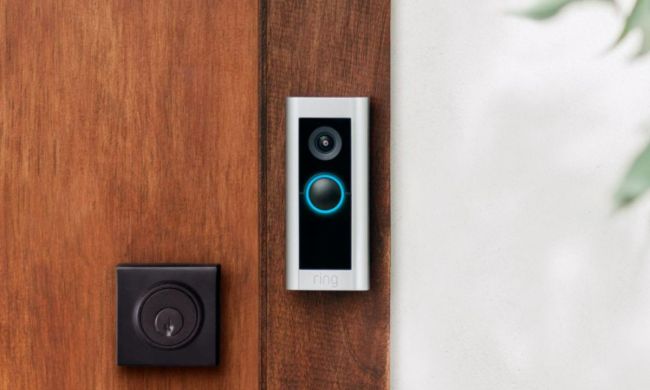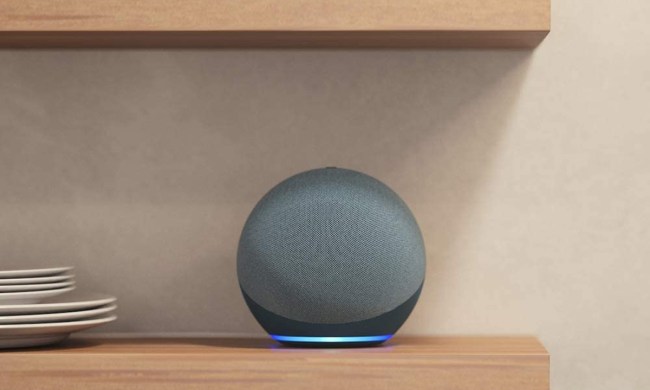- Clever peephole design and mount
- Low impact installation
- Smart doorbell, camera, and peephole in one device
- Motion and impact sensor to detect door knocks
- Amazon Alexa support with real-time video feed
- Cheap plastic finish
- Raspy audio
- Subscription required for video recording
The next time you’re drilling holes in your wall for wiring, or decorating the lounge with a fresh new look, spare a thought for renters. There’s a sea of smart home kit available that they’d love to install, but may be banned from doing so by hard-hearted landlords or, in apartment blocks, strict homeowner association rules.
The tide, however, is turning. Always quick to spot a market opportunity, Ring has jumped in with the $199 Peephole Cam. Designed to fit around an existing peephole in your front door, it delivers all the features you’d expect from a smart doorbell, but with little physical impact to the property.
The feature line-up reads just like a smart doorbell, because that’s what the Peephole Cam is, except it’s cleverly engineered to slot through your door instead of sitting next to it. An integrated 1080p high definition camera with two-way talk lets you see and chat with visitors from the comfort of your smartphone, wherever you are. You’ll receive notifications from Peephole Cam’s motions sensors when someone passes by, knocks on your door, or presses the doorbell. If you own an Alexa-enabled device with a screen – like an Amazon Echo Show or Fire TV device — you’ll receive real-time notification of callers as well as a live video feed.
The Peephole Cam is a standard, old-school peephole as well, so you can still see who’s on the other side of the door in the traditional way.
Neat, low impact installation
The great news for renters is that installing the battery-powered Peephole Cam requires no tools and should do no damage to the door. You’ll just need to unscrew your existing peephole (and keep it safe for when you move on).
Ring makes installation extra-easy with its included “Door View Key.” It’s a thin slice of steel with teeth that can help you scrape off any excess paint covering the edges of your peephole. Turn it around, and the other side of the key fits into the slots in your peephole, so you can unscrew it easily.
As usual, Ring supplies a fully illustrated booklet detailing the steps required to install the Peephole Cam. The procedure isn’t difficult, but also not as simple as installing one of Ring’s battery-powered doorbells. It’s a lot like installing a smart lock.
You won’t find the premium finish offered by competitors.
You’ll thread the Peephole Cam’s rear tube through the peephole aperture (an adapter is included to fit larger holes) and slot it into a rear assembly on the inside of your door. An integrated nut secures the Peephole Cam components, so they tightly hug your front door.
You’ll then need to connect a cable between the two assemblies. Again, Ring’s designers have taken the time to devise a cable management system that ensures any excess is neatly tucked into a channel on the rear assembly, ensuring a neat finish. Slot in the USB-rechargeable battery, and your hardware installation is complete.
Smart design & insightful features, without the premium finish of competitors
Once installed, the Peephole Cam looks decent from the front. However, like most Ring products, it lacks the premium finish offered by competitors. The satin nickel front assembly is plastic, rather than metal. The rear assembly and casing are molded in cheap, flimsy white plastic, with a stiff and sharp gray peephole cover that disappoints. We expect more from a $200 device.
What it lacks in form, the Peephole Cam has in function. As you use the Ring app, it becomes obvious that the developers spent considerable time thinking about the locations in which the device will be installed – and their challenges.
If your doorway faces a busy path or a hallway, motion sensitivity will be reduced to minimize false alarms, or you can switch it off completely. If you have a screen door or storm door covering your entrance, Night Vision will be disabled, to prevent infrared light reflecting back into and blinding the camera. Privacy zones can be easily established to avoid the camera monitoring areas such as a close neighbor’s door or window, and you can disable audio streaming or recording to prevent eavesdropping on conversations outside your door. These are all thoughtful and necessary features
Raspy audio, reasonable video and neat notifications
In use, the Peephole Cam performs in much the same way as Ring’s other smart doorbells. That means you’ll suffer the raspy audio quality we encountered on the Ring Video Doorbell 2, making two-way conversations serviceable but rarely pleasurable. On the flip side, the integrated camera offers decent imaging with a generous field of view. It lacks the sharpness and precision you’ll find from dedicated smart cams, but it’s good enough to serve its purpose.
The included HDR toggle boosts image quality a bit, but it reduces battery life, so you may well leave it disabled. When responding to callers, you’ll notice a fish-eye effect, but it’s nowhere near as pronounced as the Peephole Cam’s integrated peephole. Should you need to take advantage of the camera’s night vision mode, you’ll find images are bright and sufficiently clear to recognize callers.

The Peephole Cam’s extended features add real convenience. Motion sensitivity works well, but you’ll definitely wish to tweak the controls to optimize for your location. We loved the door knock alerts, which proved a great addition to Ring’s feature set. No more missing the UPS guy who prefers to attempt to kick our door down each day, arms laden with review hardware, rather than ring the bell.
As with other devices in its range, the Ring app supports an Event History log, with easy filters allowing you to review events by type; answered rings, motion alerts, missed knocks at the door, and more. Inevitably, video recording and storage is offered on a subscription basis. Your first 30 days are free, after which you’ll need to pay $30 per year to store and review clips from the previous 60 days. If you’re rapidly collecting Ring devices, the Ring Protect Plus tier covers them all for $100 per year.
Alexa device integration is good but limited to Amazon’s hardware. If the apartment’s rocking a Fire TV or Echo Show, the convenience of seeing who’s at the door on a larger screen is great to have. But when testing Alexa-enabled devices from other manufacturers, like the fancy new LG OLED C9 TV, we were politely informed that cameras weren’t supported.
Warranty information
The Ring Peephole Cam is supported by a standard 1-year warranty.
Our Take
The Ring Peephole Cam is a smart addition to the company’s doorbell range and a great solution for apartment dwellers. It tweaks a now well-established recipe with a clever mounting option and thoughtful features for renters and condo owners. If you’ve been left-behind in the smart home revolution by limitations on the type of kit you’re allowed to install, this Ring’s for you.
Is there a better alternative?
This is the only smart doorbell available that slots into a peephole aperture. Wired doorbells like Nest Hello offer a more stylish and in some respects, smarter experience, but they usually can’t be installed in apartments and other rental properties.
How long will it last?
While its constructed from basic plastic, we’d assume that most Ring Peephole Cam installations will be indoor and protected from the elements. Ring, which is owned by Amazon, continues to build and refine its feature set.
Should you buy it?
Yes. If you live in an apartment or condo with a door peephole available, Ring has built the Peephole Cam just for you.













